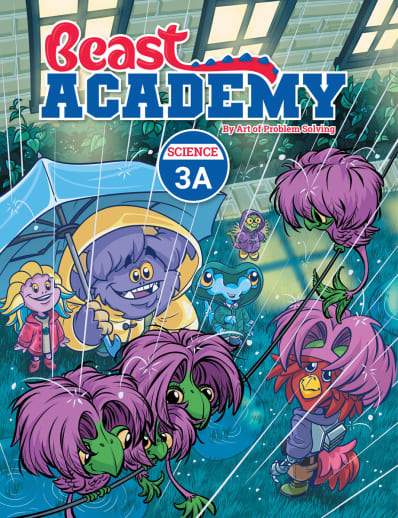Introducing the very first Beast Academy science! Similar in format to Beast Academy math, Beast Academy characters discuss important science concepts in comic style format. Instruction is also in the form of informational text with colorful infographics and other illustrations. Based on Next Generation Science Standards (NGSS), topics cover concepts, practices, and standards outlined for Grade 3. Units include Forces and Interactions, Weather and Climate, Relationships in Ecosystems, and Inheritance and Variation of Traits. Interwoven throughout the lessons are a variety of question types such as challenge, discussion, research and journal questions. Students will need access to online resources to answer research questions. Journal questions can be answered in a separate science notebook. The rest of the activity pages can be completed directly in the book. Household labs are included with clear instructions. A list of items needed for each chapter is listed at the front of the book. Book A includes sixteen chapters with the recommendation of completing one chapter a week. Book 3B contains 16 more chapters for the second semester. Solutions are included in the back. Pages are perforated for easy tear out. Non-reproducible. ~ Gina
Beast Academy Science 3A
Description
Introducing Beast Academy Science, featuring the same Beast
friends and format that you may be familiar with from Beast Academy Math. The characters are introduced at the start of each book and guide students
through their science learning, discussing important science concepts in an
engaging comic-style format. Instruction is in the form of informational text
with colorful infographics and other illustrations. Based on Next Generation
Science Standards (NGSS), topics cover concepts, practices, and standards outlined
for each grade level and go beyond those expectations. The recommended
schedule is one chapter per week for 32 weeks of science studies.
Level 3 is designed for students ages 8–10 and covers topics associated with earth science, like weather, the atmosphere, and some physics topics like motion and forces. These topics are spread across 6 units (3 units per book, 16 chapters per book).
Level 4 is designed for students ages 9–12. First semester (4A) is currently available with second semester (4B) coming later in 2025. Level 4A covers topics related to earth science, physics, and anatomy and will eventually follow the same sequence as Level 3, with topics spread out over 6 units (3 units per book, 16 chapters per book).
Interwoven throughout the lessons are a variety of question types such as challenge, discussion, research, and journal questions. The text is written directly to the student in an engaging and understandable way. Journal questions can be answered in a separate science notebook. Household labs are included throughout with clear instructions and discussion. A list of items needed for each chapter is provided at the front of the book. The activity pages can be completed directly in the book. Solutions are included in the back and can be easily removed. All pages are perforated for easy tear out. The text is non-reproducible, meaning each student will need their own copy. Additional free resources (extra practice, games, cards) are available at www.beastacademy.com.
| Product Format: | Paperback |
|---|---|
| Grade: | 3 |
| Brand: | Art of Problem Solving |
| ISBN: | 9781934124741 |
| Length in Inches: | 10.875 |
| Width in Inches: | 8.5 |
| Height in Inches: | 0.75 |
| Weight in Pounds: | 1.8 |

